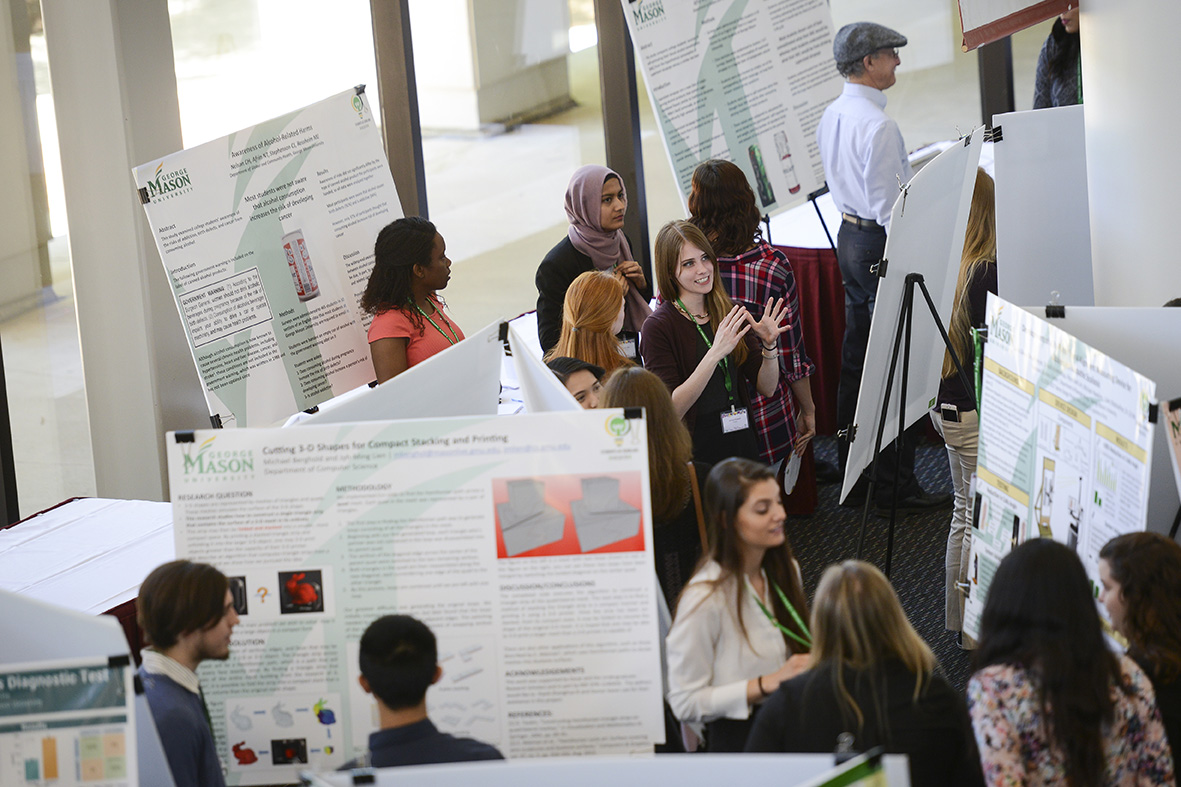It’s hard to imagine, given what Leah Bruch BS Community Health ’13, MPH ’16 has accomplished in the last few years. But when Bruch first applied for a grant from OSCAR, Mason’s undergraduate student research program, she was turned down.
“I was rejected the first time around!” Bruch told the audience at the 6th annual Celebration of Student Scholarship, held May 9 at the Center for the Arts. “And that rejection taught me how to work so much harder, and question things so much more, and become such a more diligent researcher. So that really paved the way for my experience in the OSCAR program.”
Bruch shared her experience as one of hundreds of Mason undergraduates who do valuable scholarly research each year under the guidance of faculty mentors. Her first major project was a survey of more than 1,000 Mason students concerning alcohol consumption and sexual behavior. The second was a literature review about an uncommon disease known as POTS (postural orthostatic tachycardia syndrome)—a hard-to-diagnose condition that Bruch herself was suffering from.
Bruch eventually became an OSCAR fellow, mentored other students, and presented at professional conferences. After completing her masters, for the past year she has worked at the Cystic Fibrosis Foundation, though she and her husband will soon be moving to Hawaii for his U.S. Air Force duty.
“Having the OSCAR program on your resume makes all the difference in the world, in showing people that you are capable of so much more,” said Bruch. “Especially that you are a creative thinker, you can do something outside the box, and you know how to ask questions and find answers.”
Scholarship Profile: Stephanie Bishop
Mason provost David Wu, also speaking at the event, sounded a related theme. “When you do research, you spend most of your time figuring out what the problem is in the first place—what is the right question to ask,” Wu said. “It is our ambition to have this style of learning permeate all undergraduate education here at Mason.”
Bruch ended her talk by urging her fellow Patriots to support programs such as OSCAR, which need philanthropic support to help fund research grants and student travel. “Please donate back to GMU!” she said. “Even five dollars makes a difference. It does help to continue programs such as this—to help students grow and develop in such amazing ways, as you all have today.”
Student Award Winners
The Celebration of Student Scholarship is an annual showcase for OSCAR (Office of Student Scholarship, Creative Activities, and Research), which in 2015 won the national award for excellence from the Council on Undergraduate Research.
Students representing every school of the university presented talks and posters summarizing their research projects in fields ranging from mechanical engineering to mathematics, from ecology to anthropology, and from government to computer science. The following undergraduate students received awards for excellence in research:
- Alayna Bigalbal, civil and infrastructure engineering major. Topic: the role of wetlands in preventing shoreline erosion.
- Sarah Evans, government and international politics major. Topic: U.S. counterterrorism strategies.
- Leila Martinez Bentley, anthropology major. Topic: analyzing faunal remains at Teotihuacan, Mexico.
- Jordan Ortiz, neuroscience major. Topic: educational tools to help understand the science behind brain injuries.
- Tim Reid, mathematics major. Topic: computational math, including special words in free groups.
- Chrysanthi Violaris, anthropology major. Topic: selective mortality in pre-industrial and prehistoric communities.
- Sameen Yusuf, bioengineering major. Topic: Using hydrogel nanoparticles to diagnose tuberculosis.
Between its impressive impact on students’ lives, and its well-deserved national recognition, OSCAR has become one of the jewels in Mason’s crown. Examples of how charitable gifts can be used to benefit students include:
- $500 funds one undergraduate student to travel and present his or her research at a national conference.
- $1,500 supports one student with a research grant during the fall or spring semester.
- $5,000 provides one student with a full-time summer stipend, making it possible to work all summer on an intensive research project with a faculty mentor.
Give to Support Undergraduate Research
5/15/17, RR


